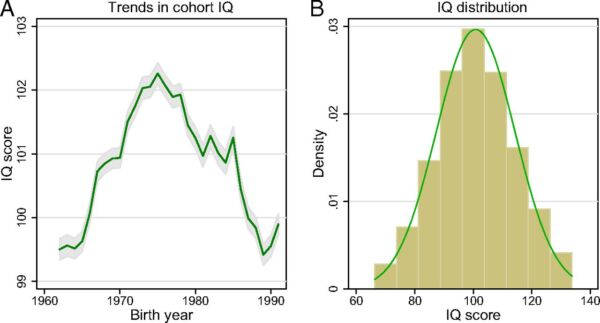
Human Intelligence
Average human intelligence was steadily rising since the late 20th Century, but we are now witnessing a slow-down and in some countries a reversal of this trend. So, have we reached the peak of human intelligence?
Intelligence Quotient (IQ) tests are a measure of what psychologists call fluid and crystallised intelligence. Typically the tests are standardised when first developed using a sample pool of test takers; they may be revised years later, standardised again with a new pool of test takers. In the late 20th Century, researchers discovered that average scores on such tests were increasing over time. They found that if a new pool of test takers were given the original unrevised test, their scores were consistently higher. On the surface at least, it appeared as if average human intelligence was rising with every generation.
Researchers observed that test scores were not only rising, but rising at a steady rate every decade. This was seen across different tests and in different regions of the world, and was remarkably consistent; a rise in average intelligence of 3 points per decade.
The phenomenon became known as the Flynn Effect, named after the late James Flynn, one of the earliest researchers to document and promote the phenomenon. There is even a TED talk by Flynn on the subject.

Example IQ test item: test taker must identify the ninth pattern
Research has shown that intelligence can be affected by many factors, including everything from nutrition to education and schooling.
Against this background, a steadily rising average level of intelligence was surprising. In the latter decades of the Twentieth Century, however, researchers kept finding further confirmation of the Flynn Effect. It raised many questions about the nature – and evolution – of intelligence. Would the increase continue indefinitely? If so, what does this say about our ancestors from centuries ago? Was there a beginning to the Flynn Effect? The latter two questions can’t be satisfactorily answered (intelligence tests being a relatively new phenomenon in terms of human history). Other questions, however, proved more realistic in terms of research offering potential answers. What was causing the steady increase in intelligence? And what else might affect it? Might the Flynn Effect end? And if so, why?
While it might not yet be possible to establish causes for the Flynn Effect, several studies in recent years suggest that the Flynn Effect has not only peaked, but that intelligence levels may be on the decline – a kind of reverse Flynn Effect.
All Things End
One large, well-known study carried out by researchers at the Ragnar Frisch Centre for Economic Research in Norway, studied IQ scores of men in National Service between 1962 and 1991. The researchers looked at nearly three-quarters of a million test results during that period. Their results – echoed in similar studies – yielded interesting results.
They found that IQ scores were rising by approximately 3 points per decade for people born between 1962 and 1975, a pattern that conforms to the Flynn Effect. However, for people born after 1975 in the study, scores declined.
Taken together it seems to suggest that the Flynn Effect peaked some years ago, and average intelligence is now declining. A research article co-authored by one of the researchers goes further and posits environmental factors as the underlying cause of the reverse Flynn

Norwegian Study: Average IQ score by birth year (A) and distribution of IQ scores (B)
Effect.
Other studies have found similar patterns – a rise of approximately 3 IQ points per decade until the mid-1970s, and then a decline of 2-3 points per decade thereafter. A Danish study of conscripts found that the rise in scores declined slowly: a rise of 2 points in the 1970s, 1.3 points in the 1980s, and by the turn of the century the trend had reversed, with IQ scores declining.
Studies in France, Germany, and the UK have all found similar results: a rise in average IQ scores that peaked around the mid-1970s, and then a consistent decline in later years.
Other Factors
While much of the research in recent years suggests the Flynn Effect was a temporary phenomenon, there is less consensus on the reasons for its reversal, as well as whether this decline will continue or also reach a plateau. Is a single factor responsible? Or are there a multitude of complex factors we have yet to fully understand?
An article in the Guardian in 2019 posited air pollution as a key factor. Higher CO2 levels in large cities, the article suggested, can affect the body and every organ; higher levels of CO2 can affect cognition.
As studies of IQ in a population cover years – sometimes decades – the number of potential factors at play is huge, and differs from country to country – and even regions within nations.
 Cultural factors such as better education in recent decades in many parts of the world. In many regions, education for women is still a relatively recent development, and can also affect test performance. Air pollution, pesticides, and other transient phenomena are possible factors too.
Cultural factors such as better education in recent decades in many parts of the world. In many regions, education for women is still a relatively recent development, and can also affect test performance. Air pollution, pesticides, and other transient phenomena are possible factors too.
Our reliance on technology and the development of the internet could affect intelligence too: when every question can be answered with a few keystrokes or a request to Alexa, are we losing some essential part of the human experience?
And how will AI like ChatGPT shape the learning and intellectual development of future generations in years to come? Such answers, sadly, may be many years away as there is still so much more to learn about how the human mind works. There are, however, many scientists studying the many aspects of learning and intelligence, and that should provide some reassurance: the answers may be generations away, but the innate human ability to adapt and persevere will surely help the next generation of scientists and researchers.





Leave A Comment